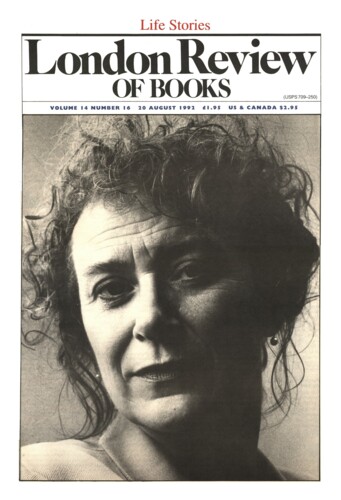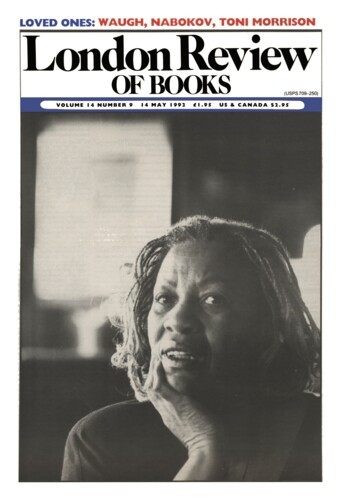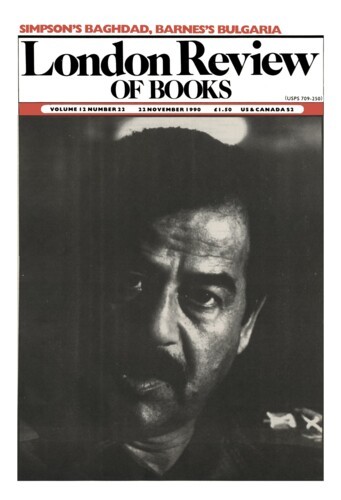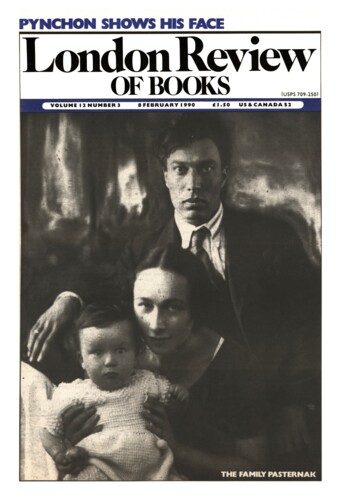Christopher Ricks
Christopher Ricks is the author of Keats and Embarrassment, among other books. He is a professor of English at Cambridge University.
High Punctuation
Christopher Ricks, 14 May 1992
Fecund and jocund, well-earned and learnèd, wittily wily, But I digress is a delight and a treasure-house, alive with moving illumination and with benign warning, in short a delight-house of a book. It is the best work at once of literary criticism and of literary history I’ve read for many and many a day.
Umpteens
Christopher Ricks, 22 November 1990
Adrian Room has garnered umpteen dedications, and some of them are of interest, but what is the point of unrolling them alphabetically as something purporting to be a dictionary? Abbott opens, and Zangwill closes, yet the book is not a work of reference. It is an anthology. A lazy piece of work, or of relaxation, and not just because its compiler has declined the effort of an imaginative ordering and has instead fallen back on A to zzzz.
Appelfeld 1990
Christopher Ricks, 8 February 1990
The upright fiction of Aharon Appelfeld arises from the level facts of his anguished and brave young life. Like the novels themselves, a note on their author is laconic, lapidary and on oath:
Diary: Thoughts of Beckett at News of His Death
Christopher Ricks, 25 January 1990
Thoughts of Beckett at news of his death. The unforgettable Hardy title has been knocking. ‘Thoughts of Phena at News of Her Death’. It had previously come to mind at news of another death, Philip Larkin’s, because of his once pinpointing essentially the birth of his own art: the moment when he stopped condescending to Hardy’s. ‘As regards his verse I shared Lytton Strachey’s verdict that “the gloom is not even relieved by a little elegance of diction.” This opinion did not last long; if I were asked to date its disappearance, I should guess it was the morning I first read “Thoughts of Phena at News of Her Death”.’
Pieces about Christopher Ricks in the LRB
Ti tum ti tum ti tum: Chic Sport Shirker
Colin Burrow, 7 October 2021
If one suspects, at times, that one’s eye is being led on a dance, it is at least always a merry one, and Christopher Ricks is a fine enough critic to worry whether he might have crossed the invisible...
I gotta use words: Eliot speaks in tongues
Mark Ford, 11 August 2016
T.S. Eliot’s mind was a vast, labyrinthine echo chamber, and perhaps more than any other canonical poet of the English language he was conscious of the previous uses by other writers of the words he...
Misgivings: Christopher Ricks
Adam Phillips, 22 July 2010
In his first book, Milton’s Grand Style, Christopher Ricks showed us that Milton wanted his readers to be attentive to the fact that when our ‘first parents’ fell, their...
Forget the Dylai Lama: Bob Dylan
Thomas Jones, 6 November 2003
A scene from a concert: on stage, a young Jewish-American folk singer/ songwriter, accompanied only by his own guitar and the harmonica around his neck, with a forceful, nasal voice and...
Poisonous Frogs: Allusion v. Influence
Laura Quinney, 8 May 2003
This book comes in two parts. The first, ‘The Poet as Heir’, investigates characteristic uses of allusion by major British poets of the 18th and 19th centuries: Dryden, Pope,...
Elegant Extracts: anthologies
Leah Price, 3 February 2000
Anthologies attract good haters. In the 1790s, the reformer Hannah More blamed their editors for the decay of morals: to let people assume that you had read the entire work from which an...
Writhing and Crawling and Leaping and Darting and Flattening and Stretching
Helen Vendler, 31 October 1996
When Emerson wrote to Whitman that there must have been ‘a long foreground’ preceding the composition of Leaves of Grass, he expressed the curiosity every reader feels when coming upon...
The Verity of Verity
Marilyn Butler, 1 August 1996
Christopher Ricks’s new book makes available many of his distinguished lectures given in the Eighties and Nineties. The essays retain a sense of occasion, and of a star performance on...
Leases of Lifelessness
Denis Donoghue, 7 October 1993
Near to death in Malone Dies, Malone says: ‘I wonder what my last words will be, written, the others do not endure, but vanish, into thin air.’ Beckett’s Dying Words is not a...
Good enough for Jesus
Charlotte Brewer, 25 January 1990
The second edition of The State of the Language, published ten years on from the first, contains 53 essays and nine poems, each by a different author. The dust-jackets of both editions are almost...
Negative Capability
Dan Jacobson, 24 November 1988
T.S. Eliot and Prejudice. Keats and Embarrassment. The parallel between the title of Christopher Ricks’s new book and that of his earlier study of Keats is not accidental. In each case he...
Spruce
John Bayley, 2 June 1988
On 9 May 1933, A.E. Housman, Professor of Latin at Trinity College, Cambridge, and a scholar worshipped and hated for his meticulous standards and his appalling sarcasms on the unscholarly,...
Tennyson’s Text
Danny Karlin, 12 November 1987
Writing in 1842 to his friend Alfred Domett, who had emigrated to New Zealand, Robert Browning enclosed ‘Tennyson’s new vol. and, alas, the old with it – that is what he calls...
Beddoes’ Best Thing
C.H. Sisson, 20 September 1984
‘This is,’ as Professor Ricks says, in his rather baroque manner, ‘a gathering of essays, not a march of chapters’; each essay ‘attends to an aspect, feature, or...
English Changing
Frank Kermode, 7 February 1980
That language changes, and that we cannot prevent it from doing so, is a fact known to all, though some of us can no more contemplate it with resignation than we can death and taxes. It is two...
Read anywhere with the London Review of Books app, available now from the App Store for Apple devices, Google Play for Android devices and Amazon for your Kindle Fire.
Sign up to our newsletter
For highlights from the latest issue, our archive and the blog, as well as news, events and exclusive promotions.





